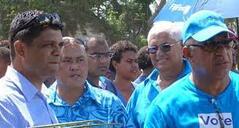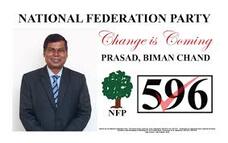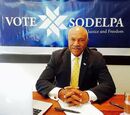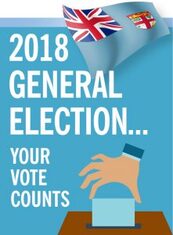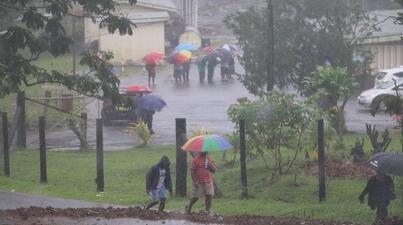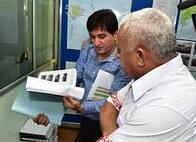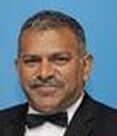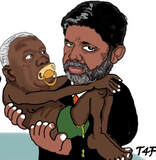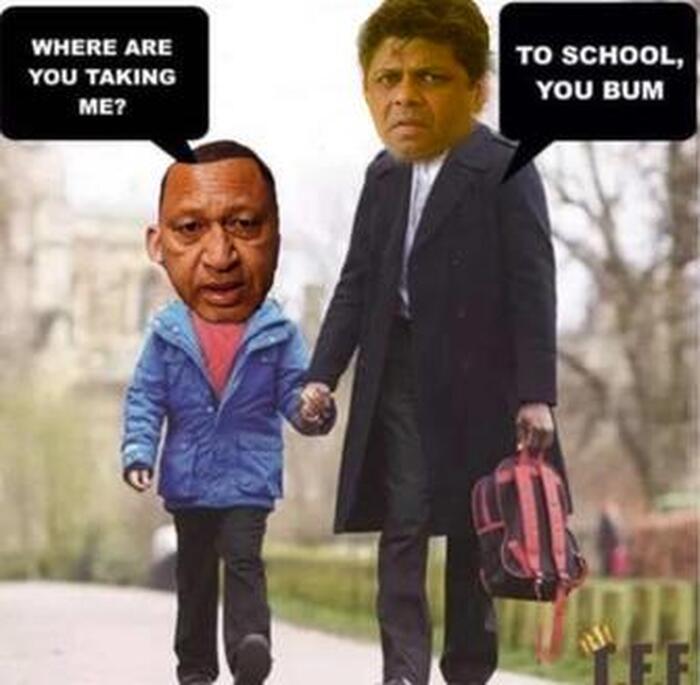'...The PM says the AG specifically told him that Rabuka would never win and that Biman Prasad would be the main opposition leader facing him in the parliament. As miscalculations go, it was the mother of them all. And even to many of its supporters, it’s still a mystery why the FijiFirst Party membership didn’t demand an accounting in the election aftermath.' -
Graham Davis on the 2018 Election Result:
"It was certainly not the vote of confidence Frank Bainimarama had expected. Indeed it was personally devastating, so much so that he withdrew from public view for a time and said privately he had never been so depressed in his entire life. To have come so close to repudiation and defeat given the government’s record of service delivery was a crushing blow. Yet all of the signs were there had he not placed his absolute trust in the judgment of his de-facto deputy, the Attorney General and so-called minister for everything, Aiyaz Sayed-Khaiyum. In the immediate election aftermath, the AG – as I’ve already reported – delegated his brother, Riyaz, to ask me to lobby the PM to bestow upon him the formal title of deputy PM. No chance. Incredibly, the Prime Minister said privately in the election aftermath that the AG had not only told him that FijiFirst was certain to win but that SODELPA would be decimated. So much so that the NFP would emerge as the main opposition party in Fiji. Some decimation. But this false prediction was just one of a number of striking miscalculations on the part of the AG for which he has still not been held to account. And it is high time that he is or it is FijiFirst that is heading for decimation at the next election in 2022, with all the potential for instability that entails. For his part, the AG privately blamed the Prime Minister for the outcome. He said the PM had undertaken to concentrate his efforts on winning as many votes as possible in the vanua but had become complacent and hadn’t done so. Yet it was with the active encouragement of the AG that the PM had been busy crisscrossing the world promoting Fiji’s climate agenda as President of COP23 without realising that his support at home was crumbling. And partly under an onslaught from the opposition about his reported $3000 a day in expenses whenever he was absent from Fiji.
 Davis
Davis
By
GRAHAM DAVIS, Grubsheet Feejee
BAD WEATHER on polling day is the enemy of any government seeking re-election and the FijiFirst government was out of luck as the heavens opened across the Fiji Group on Wednesday November 14 2018. Fijians woke to torrential rain and flooding that would eventually force the suspension of voting at 26 polling stations until the following Saturday. I recall waking in Suva that morning to the sound of the deluge and saying to my host: “Unfortunately, people are going to look out the window and say “Frank is going to win anyway” and go back to bed”. And so it proved to be, with a fall of almost 13 per cent in the turnout over that of the first election under the 2013 Constitution in September 2014. Of the 637,537 registered voters, 458,570 of them, or 72 per cent of the total, braved the torrential rain to cast their votes. But more than a quarter of registered Fijian voters didn’t bother.
GRAHAM DAVIS, Grubsheet Feejee
BAD WEATHER on polling day is the enemy of any government seeking re-election and the FijiFirst government was out of luck as the heavens opened across the Fiji Group on Wednesday November 14 2018. Fijians woke to torrential rain and flooding that would eventually force the suspension of voting at 26 polling stations until the following Saturday. I recall waking in Suva that morning to the sound of the deluge and saying to my host: “Unfortunately, people are going to look out the window and say “Frank is going to win anyway” and go back to bed”. And so it proved to be, with a fall of almost 13 per cent in the turnout over that of the first election under the 2013 Constitution in September 2014. Of the 637,537 registered voters, 458,570 of them, or 72 per cent of the total, braved the torrential rain to cast their votes. But more than a quarter of registered Fijian voters didn’t bother.
The Prime Minister, Frank Bainimarama, was to subsequently blame the weather for the humiliating result that saw him barely scrape back into office. In 2014, he had won a landslide victory when FijiFirst captured almost 60 per cent of the vote to give it 32 seats in the parliament. Four years later, the party suffered a swing against it of almost 10 per cent, winning just 50.02 per cent of the vote and losing five seats to give it a total of 27 seats in the 51-seat parliament. As another military man, the Duke of Wellington, famously said when he narrowly defeated Napoleon at Waterloo, “it was a damn close-run thing”.
By comparison, Bainimarama’s old nemesis, Sitiveni Rabuka, had lifted SODELPA’s share of the vote by almost 12 per cent, giving it an extra six seats in parliament and taking its total to 21. The National Federation Party stayed the same on three seats but with an overall swing in its favour of almost two per cent. It wasn’t hard to do the math, as the Americans say. In 2018, 10 per cent fewer Fijians had voted for the Bainimarama government than four years before, while 12 per cent more had switched to SODELPA and two per cent more had chosen the NFP.
It was certainly not the vote of confidence Frank Bainimarama had expected. Indeed it was personally devastating, so much so that he withdrew from public view for a time and said privately he had never been so depressed in his entire life. To have come so close to repudiation and defeat given the government’s record of service delivery was a crushing blow. Yet all of the signs were there had he not placed his absolute trust in the judgment of his de-facto deputy, the Attorney General and so-called minister for everything, Aiyaz Sayed-Khaiyum. In the immediate election aftermath, the AG – as I’ve already reported – delegated his brother, Riyaz, to ask me to lobby the PM to bestow upon him the formal title of deputy PM. No chance.
Incredibly, the Prime Minister said privately in the election aftermath that the AG had not only told him that FijiFirst was certain to win but that SODELPA would be decimated. So much so that the NFP would emerge as the main opposition party in Fiji. Some decimation. But this false prediction was just one of a number of striking miscalculations on the part of the AG for which he has still not been held to account. And it is high time that he is or it is FijiFirst that is heading for decimation at the next election in 2022, with all the potential for instability that entails.
For his part, the AG privately blamed the Prime Minister for the outcome. He said the PM had undertaken to concentrate his efforts on winning as many votes as possible in the vanua but had become complacent and hadn’t done so. Yet it was with the active encouragement of the AG that the PM had been busy crisscrossing the world promoting Fiji’s climate agenda as President of COP23 without realising that his support at home was crumbling. And partly under an onslaught from the opposition about his reported $3000 a day in expenses whenever he was absent from Fiji.
The AG had maintained all along that the government needed to increase its majority as much as possible in 2018 to enable it to counter the burden of incumbency that it was bound to suffer in 2022. By then, Bainimarama – assuming he stayed on as leader – would have been in power for 16 years since his military takeover in 2006 and eight years since the 2014 election had bestowed on him the mantle of democratic legitimacy. But the AG was also driven by another agenda. He hoped that increasing FijiFirst’s majority in the parliament would also give him the buffer he needed electorally if he was ever to succeed Bainimarama as prime minister. Even if he could get the PM to persuade his fellow cabinet colleagues and the military to back a Sayed-Khaiyum prime ministership, there was bound to be some form of backlash in the country and an overwhelming victory in 2018 might give him the margin he needed to crash through.
Aiyaz Sayed-Khaiyum’s overconfidence was apparent in Bainimarama’s unfortunate boast in the election lead-up that the government was aiming to win all 51 seats in the parliament. There’s nothing the voters hate more than overt hubris in their leaders on election eve yet over the years, FijiFirst has turned hubris into an art form. In a society – at least among the iTaukei – that values humility and where a bowed head is the form when someone praises you in public, humility in the ruling party has always been in short order. And it’s clear that whatever its proud record of service delivery in the vanua – and that is undeniable – a significant number of iTaukei had grown increasingly irritated with what I’ve already described in these columns as the veibeci (looking down on people) and viavialevu (arrogance and pretentiousness) of the FijiFirst leadership.
Whatever baggage he carries for triggering the whole sorry saga of Fiji’s coup culture, Sitiveni Rabuka identified this dissatisfaction and exploited it to the full. All through the campaign and especially when he came close in the courts to not being able to contest the election at all, Rabuka adopted a posture of humility, forbearance and respect for the rule of law that clearly paid off at the polls. To many Fijians – and especially a new generation who hadn’t lived through the turmoil he created with the coups of 1987 – he came across as genuinely humble and someone willing to listen. Whereas Bainimarama and the AG looked cocky and prescriptive. And in the AG’s case, hubris had descended into a dangerous misjudgement of the mood of the people that in any democracy, is generally a prelude to defeat.
This hubris was evident in the timing of the election and what appears to be an extraordinary miscalculation. Had the government called an election immediately after the 2018-19 Budget on June 28 – which was well received – it would have almost certainly done a lot better than it did waiting till November. Yet rumours persist that the AG was determined to knock Sitiveni Rabuka out of contention with the FICAC prosecution brought against him for allegedly failing to declare his assets, liabilities and income in contravention of the Political Parties Act. If this is true, then the tactic backfired. The prosecution failed in the courts and again on appeal to the High Court. Two days before the election, Rabuka was cleared to contest the poll and clearly benefited from a wave of sympathy from those in the community convinced he’d been persecuted.
For all the bravado and chest beating of the leadership, it had been clear for some time that the government’s fortunes were waning. A shockingly inept election campaign merely confirmed the perception, even to its own supporters, that FijiFirst was in trouble. But there was also hard evidence that its fortunes were slipping from opinion polling conducted by the CJ Patel group, the owners of the government’s principal cheer squad at the Fiji Sun newspaper, which unbeknown to most Fijians, the AG controls.
This polling showed a steady decline in support for FijiFirst in the election lead-up and an opposition resurgence. Yet in an astonishing display of the AG’s unwillingness to confront reality, he ordered the suppression of an opinion poll close to election day that showed a dangerous collapse in the FijiFirst vote and a swing to the opposition. It never saw the light of day – a shocking indictment of the Fiji Sun’s lack of independence for bowing to pressure not to publish and the AG’s lack of judgment in ordering the poll to be censored.
It could not have been a case of the polls being disbelieved. In fact, the Fiji Sun polling had been remarkably accurate in predicting the result in 2014. So this was a clear case of a politician staring down the evidence, of not wanting the nation to know that the public didn’t share the government’s high opinion of itself. It was not only an extraordinary misjudgment but contrary to all accepted practice in a democracy. Because the conventional wisdom in politics is to do the exact opposite of what the AG did. If the opinion polls show the opposition closing in on you – which is what the CJ Patel polling did – you publicise it to the maximum. You want everyone to know that the government is in trouble and there is a serious likelihood of defeat. In fact, you tell everyone that you are going to lose. So that whatever the weather outside on the day, your supporters are motivated enough to make the effort to turn out and support you.
You also do everything you can to focus voters minds on the alternative without the Punch and Judy histrionics that have become a feature of Fijian political debate. With SODELPA, the alternative was a party with an array of negative baggage in terms of its record on ethnic and religious equality and a leader who’d presided over the country’s worst financial loss with the collapse of the National Bank of Fiji. SODELPA was also riven by deep divisions that even now, long after the election, are still being played out. There was ample reason therefore – despite Rabuka’s show of humility and claim to have embraced a multi-ethnic agenda – for many Fijians to be extremely wary of the possibility of him replacing Bainimarama as prime minister. Even many SODELPA supporters doubted that the party was ready to govern. But the government failed to press home the advantage, almost certainly because the PM says the AG specifically told him that Rabuka would never win and that Biman Prasad would be the main opposition leader facing him in the parliament. As miscalculations go, it was the mother of them all. And even to many of its supporters, it’s still a mystery why the FijiFirst Party membership didn’t demand an accounting in the election aftermath. But here’s the answer to that:
As Secretary-General of FijiFirst, Aiyaz Sayed-Khaiyum controls the party. The party’s constitution – over which the AG presided – does not allow the membership to vote against him, let alone remove him. Only the party leader, Frank Bainimarama, can do that. In fact, FijiFirst is notable for a lack of democracy in the conduct of its affairs. It doesn’t hold party meetings at which the membership can even question its direction or individual policies. It is essentially a two-man party – the AG and the PM – at the head of what is in effect a two-man government in which they wield total control. Cabinet ministers do as they’re told on pain of dismissal or being disendorsed . So that while the AG and PM can claim the credit when things go well, when mistakes are made, the buck stops with them.
Yet having surrendered total control of the FijiFirst election campaign to the AG, the Prime Minister had sowed the seeds of his own humiliation. Just as power corrupts – as the old adage goes – it invariably gives leaders a false sense of security and perspective. The AG and the PM inhabit a bubble in which they are rarely questioned as they travel the country in convoys, dispensing largess, cutting ribbons and making speeches to the effect that under their leadership, Fijians have never had it so good. The AG, in particular, has also become especially adept at telling other people where they are going wrong. Yet he and the PM have resolutely refused to surround themselves with professionals whose job it is to tell them where they are going wrong – the advisers and political staffers whose primary task is to keep their bosses grounded and re-electable in any democratic government the world over.
The Australian Government has evidently offered assistance to “professionalise” the offices of the Prime Minister and his ministers but to no avail. So that with one or two notable exceptions – consummate professionals who shall remain nameless in the interests of good governance – bearers of bad news or unwelcome observations to the Fijian leadership are few and far between. Which largely explains why they have developed such a tin ear to criticism and behave with much the same level of conviction and lack of self-doubt as they did in the dictatorship. They are also fortified in that conviction by the slavish coverage of their media supporters and especially the Fiji Sun.
By comparison, Bainimarama’s old nemesis, Sitiveni Rabuka, had lifted SODELPA’s share of the vote by almost 12 per cent, giving it an extra six seats in parliament and taking its total to 21. The National Federation Party stayed the same on three seats but with an overall swing in its favour of almost two per cent. It wasn’t hard to do the math, as the Americans say. In 2018, 10 per cent fewer Fijians had voted for the Bainimarama government than four years before, while 12 per cent more had switched to SODELPA and two per cent more had chosen the NFP.
It was certainly not the vote of confidence Frank Bainimarama had expected. Indeed it was personally devastating, so much so that he withdrew from public view for a time and said privately he had never been so depressed in his entire life. To have come so close to repudiation and defeat given the government’s record of service delivery was a crushing blow. Yet all of the signs were there had he not placed his absolute trust in the judgment of his de-facto deputy, the Attorney General and so-called minister for everything, Aiyaz Sayed-Khaiyum. In the immediate election aftermath, the AG – as I’ve already reported – delegated his brother, Riyaz, to ask me to lobby the PM to bestow upon him the formal title of deputy PM. No chance.
Incredibly, the Prime Minister said privately in the election aftermath that the AG had not only told him that FijiFirst was certain to win but that SODELPA would be decimated. So much so that the NFP would emerge as the main opposition party in Fiji. Some decimation. But this false prediction was just one of a number of striking miscalculations on the part of the AG for which he has still not been held to account. And it is high time that he is or it is FijiFirst that is heading for decimation at the next election in 2022, with all the potential for instability that entails.
For his part, the AG privately blamed the Prime Minister for the outcome. He said the PM had undertaken to concentrate his efforts on winning as many votes as possible in the vanua but had become complacent and hadn’t done so. Yet it was with the active encouragement of the AG that the PM had been busy crisscrossing the world promoting Fiji’s climate agenda as President of COP23 without realising that his support at home was crumbling. And partly under an onslaught from the opposition about his reported $3000 a day in expenses whenever he was absent from Fiji.
The AG had maintained all along that the government needed to increase its majority as much as possible in 2018 to enable it to counter the burden of incumbency that it was bound to suffer in 2022. By then, Bainimarama – assuming he stayed on as leader – would have been in power for 16 years since his military takeover in 2006 and eight years since the 2014 election had bestowed on him the mantle of democratic legitimacy. But the AG was also driven by another agenda. He hoped that increasing FijiFirst’s majority in the parliament would also give him the buffer he needed electorally if he was ever to succeed Bainimarama as prime minister. Even if he could get the PM to persuade his fellow cabinet colleagues and the military to back a Sayed-Khaiyum prime ministership, there was bound to be some form of backlash in the country and an overwhelming victory in 2018 might give him the margin he needed to crash through.
Aiyaz Sayed-Khaiyum’s overconfidence was apparent in Bainimarama’s unfortunate boast in the election lead-up that the government was aiming to win all 51 seats in the parliament. There’s nothing the voters hate more than overt hubris in their leaders on election eve yet over the years, FijiFirst has turned hubris into an art form. In a society – at least among the iTaukei – that values humility and where a bowed head is the form when someone praises you in public, humility in the ruling party has always been in short order. And it’s clear that whatever its proud record of service delivery in the vanua – and that is undeniable – a significant number of iTaukei had grown increasingly irritated with what I’ve already described in these columns as the veibeci (looking down on people) and viavialevu (arrogance and pretentiousness) of the FijiFirst leadership.
Whatever baggage he carries for triggering the whole sorry saga of Fiji’s coup culture, Sitiveni Rabuka identified this dissatisfaction and exploited it to the full. All through the campaign and especially when he came close in the courts to not being able to contest the election at all, Rabuka adopted a posture of humility, forbearance and respect for the rule of law that clearly paid off at the polls. To many Fijians – and especially a new generation who hadn’t lived through the turmoil he created with the coups of 1987 – he came across as genuinely humble and someone willing to listen. Whereas Bainimarama and the AG looked cocky and prescriptive. And in the AG’s case, hubris had descended into a dangerous misjudgement of the mood of the people that in any democracy, is generally a prelude to defeat.
This hubris was evident in the timing of the election and what appears to be an extraordinary miscalculation. Had the government called an election immediately after the 2018-19 Budget on June 28 – which was well received – it would have almost certainly done a lot better than it did waiting till November. Yet rumours persist that the AG was determined to knock Sitiveni Rabuka out of contention with the FICAC prosecution brought against him for allegedly failing to declare his assets, liabilities and income in contravention of the Political Parties Act. If this is true, then the tactic backfired. The prosecution failed in the courts and again on appeal to the High Court. Two days before the election, Rabuka was cleared to contest the poll and clearly benefited from a wave of sympathy from those in the community convinced he’d been persecuted.
For all the bravado and chest beating of the leadership, it had been clear for some time that the government’s fortunes were waning. A shockingly inept election campaign merely confirmed the perception, even to its own supporters, that FijiFirst was in trouble. But there was also hard evidence that its fortunes were slipping from opinion polling conducted by the CJ Patel group, the owners of the government’s principal cheer squad at the Fiji Sun newspaper, which unbeknown to most Fijians, the AG controls.
This polling showed a steady decline in support for FijiFirst in the election lead-up and an opposition resurgence. Yet in an astonishing display of the AG’s unwillingness to confront reality, he ordered the suppression of an opinion poll close to election day that showed a dangerous collapse in the FijiFirst vote and a swing to the opposition. It never saw the light of day – a shocking indictment of the Fiji Sun’s lack of independence for bowing to pressure not to publish and the AG’s lack of judgment in ordering the poll to be censored.
It could not have been a case of the polls being disbelieved. In fact, the Fiji Sun polling had been remarkably accurate in predicting the result in 2014. So this was a clear case of a politician staring down the evidence, of not wanting the nation to know that the public didn’t share the government’s high opinion of itself. It was not only an extraordinary misjudgment but contrary to all accepted practice in a democracy. Because the conventional wisdom in politics is to do the exact opposite of what the AG did. If the opinion polls show the opposition closing in on you – which is what the CJ Patel polling did – you publicise it to the maximum. You want everyone to know that the government is in trouble and there is a serious likelihood of defeat. In fact, you tell everyone that you are going to lose. So that whatever the weather outside on the day, your supporters are motivated enough to make the effort to turn out and support you.
You also do everything you can to focus voters minds on the alternative without the Punch and Judy histrionics that have become a feature of Fijian political debate. With SODELPA, the alternative was a party with an array of negative baggage in terms of its record on ethnic and religious equality and a leader who’d presided over the country’s worst financial loss with the collapse of the National Bank of Fiji. SODELPA was also riven by deep divisions that even now, long after the election, are still being played out. There was ample reason therefore – despite Rabuka’s show of humility and claim to have embraced a multi-ethnic agenda – for many Fijians to be extremely wary of the possibility of him replacing Bainimarama as prime minister. Even many SODELPA supporters doubted that the party was ready to govern. But the government failed to press home the advantage, almost certainly because the PM says the AG specifically told him that Rabuka would never win and that Biman Prasad would be the main opposition leader facing him in the parliament. As miscalculations go, it was the mother of them all. And even to many of its supporters, it’s still a mystery why the FijiFirst Party membership didn’t demand an accounting in the election aftermath. But here’s the answer to that:
As Secretary-General of FijiFirst, Aiyaz Sayed-Khaiyum controls the party. The party’s constitution – over which the AG presided – does not allow the membership to vote against him, let alone remove him. Only the party leader, Frank Bainimarama, can do that. In fact, FijiFirst is notable for a lack of democracy in the conduct of its affairs. It doesn’t hold party meetings at which the membership can even question its direction or individual policies. It is essentially a two-man party – the AG and the PM – at the head of what is in effect a two-man government in which they wield total control. Cabinet ministers do as they’re told on pain of dismissal or being disendorsed . So that while the AG and PM can claim the credit when things go well, when mistakes are made, the buck stops with them.
Yet having surrendered total control of the FijiFirst election campaign to the AG, the Prime Minister had sowed the seeds of his own humiliation. Just as power corrupts – as the old adage goes – it invariably gives leaders a false sense of security and perspective. The AG and the PM inhabit a bubble in which they are rarely questioned as they travel the country in convoys, dispensing largess, cutting ribbons and making speeches to the effect that under their leadership, Fijians have never had it so good. The AG, in particular, has also become especially adept at telling other people where they are going wrong. Yet he and the PM have resolutely refused to surround themselves with professionals whose job it is to tell them where they are going wrong – the advisers and political staffers whose primary task is to keep their bosses grounded and re-electable in any democratic government the world over.
The Australian Government has evidently offered assistance to “professionalise” the offices of the Prime Minister and his ministers but to no avail. So that with one or two notable exceptions – consummate professionals who shall remain nameless in the interests of good governance – bearers of bad news or unwelcome observations to the Fijian leadership are few and far between. Which largely explains why they have developed such a tin ear to criticism and behave with much the same level of conviction and lack of self-doubt as they did in the dictatorship. They are also fortified in that conviction by the slavish coverage of their media supporters and especially the Fiji Sun.
Jyoti Pratibha is in constant contact with the AG on these exercises in spin and is such a trusted intimate that the AG has appointed her to the Council of the Fiji National University, where the Acting Deputy Chancellor happens to be his aunt, Nur Bano Ali. It also emboldened Pratibha last week to retaliate publicly when the Acting Permanent Secretary for Health, the respected Dr James Fong, had the temerity to publicly criticise the ethics of the Fiji Sun. She retorted that bureaucrats in a democracy “do not instruct professional news media on what they can report on matters of public interest”. No. But unprofessional propagandists are a different matter altogether.
At the same time as it has surrendered its editorial independence to the AG, the Fiji Sun receives tax-payer-funded government advertising that isn’t given to its competitor, the Fiji Times. All of which makes for a glaring absence of transparency and disclosure on both sides. It is every taxpayer – regardless of political affiliation – who ultimately pays the Fiji Sun to carry exclusive advertising without knowing that part of the deal is that the government gets positive coverage in return. And the readers of the Fiji Sun are hoodwinked by the paper about a secret arrangement that is highly unethical, arguably even corrupt, when in a genuine democracy, the duty of any reputable mainstream media outlet is to side with the people to keep their elected representatives honest and keep their news columns free of government propaganda.
It is clearly long past the stage where the AG saying “that’s a good question, Jyoti”, at a news conference can be regarded by the discerning observer with anything resembling a straight face. But in a live broadcast on Facebook in the lead-up to the last election, the AG said precisely this in response to a question from Jyoti Pratibha in a manner that made me wince. I sent him a text message saying that the question was too obviously a “Dorothy Dixer” – an Australian term for a rehearsed or planted question – and that he should avoid such exchanges. Soon afterwards, I got an angry phone call from the AG saying that my “negativity about everything” was upsetting him. He only wanted positive feedback and suggestions from now on. Or none at all. I testily countered that I was merely giving him professional advice. Yet this was the prevailing attitude at the heart of government that sowed the seeds for the 2018 election result.
Months before, It had already become clear to a significant number of its supporters that the government had lost its way and public opinion was turning against it. Yet whenever I expressed that opinion to members of the AG’s circle, I was made to feel like the resident Cassandra – the prophet in classical mythology who correctly predicts doom and disaster but is fated never to be believed. This included being told with absolute convicton that Pio Tikoduadua and Lenora Qereqeretabua would never make it into the parliament when it was clear that they were potent vote-winners, as indeed they proved to be. Even some of the PM’s closest confidantes had warned him in advance of the 2018 election that his position was not as secure as he and the AG seemed to believe. So on election night, five months later, I wasn’t the only one to be unsurprised by the government’s near defeat, having also become aware in the meantime of the Fiji Sun polling that the AG had used his influence with the paper to suppress.
In blind panic after the results came in, the AG bypassed my successors at Qorvis and released a statement that blamed FijiFirst’s poor showing on the “lies of the opposition and the Fiji Times”. It was a crude and self-serving attempt to deflect criticism away from himself for having run a demonstrably substandard campaign. These included billboards erected around the country with motherhood statements such as “Honesty and Justice” and “Embrace Truth, Reject Lies” that were seemingly unrelated to any party except for the barely visible name of the authorising agent, the AG, in small print in the bottom right hand corner. It was an expensive campaign with very little obvious point in that none of it highlighted the government’s considerable achievements. And there was even less in the way of novelty images to capture the public imagination, such as the Bainimarama Bus that carried the PM on his electioneering visits in 2014. Yet here was the AG blaming the opposition and the Fiji Times for a failure of his own making.
This was surely an opportunity for the government to say: “Vinaka vakalevu for again putting your trust in us but we realise you have sent us a message and we intend to listen and respond”. But not a bit of it. No acknowledgement of near defeat, just a doubling down of the arrogance and finger pointing that produced the poor result in the first place. It was the worst possible response to the stark reality that FijiFirst desperately needed a period of soul searching and a change of direction if it was to have any hope of securing its position in 2022. But 22 months later, nothing at all has changed, apart, of course, from a disintegrating economy and a significant increase in public disenchantment that is a sure signal of the crushing defeat to come.
At the same time as it has surrendered its editorial independence to the AG, the Fiji Sun receives tax-payer-funded government advertising that isn’t given to its competitor, the Fiji Times. All of which makes for a glaring absence of transparency and disclosure on both sides. It is every taxpayer – regardless of political affiliation – who ultimately pays the Fiji Sun to carry exclusive advertising without knowing that part of the deal is that the government gets positive coverage in return. And the readers of the Fiji Sun are hoodwinked by the paper about a secret arrangement that is highly unethical, arguably even corrupt, when in a genuine democracy, the duty of any reputable mainstream media outlet is to side with the people to keep their elected representatives honest and keep their news columns free of government propaganda.
It is clearly long past the stage where the AG saying “that’s a good question, Jyoti”, at a news conference can be regarded by the discerning observer with anything resembling a straight face. But in a live broadcast on Facebook in the lead-up to the last election, the AG said precisely this in response to a question from Jyoti Pratibha in a manner that made me wince. I sent him a text message saying that the question was too obviously a “Dorothy Dixer” – an Australian term for a rehearsed or planted question – and that he should avoid such exchanges. Soon afterwards, I got an angry phone call from the AG saying that my “negativity about everything” was upsetting him. He only wanted positive feedback and suggestions from now on. Or none at all. I testily countered that I was merely giving him professional advice. Yet this was the prevailing attitude at the heart of government that sowed the seeds for the 2018 election result.
Months before, It had already become clear to a significant number of its supporters that the government had lost its way and public opinion was turning against it. Yet whenever I expressed that opinion to members of the AG’s circle, I was made to feel like the resident Cassandra – the prophet in classical mythology who correctly predicts doom and disaster but is fated never to be believed. This included being told with absolute convicton that Pio Tikoduadua and Lenora Qereqeretabua would never make it into the parliament when it was clear that they were potent vote-winners, as indeed they proved to be. Even some of the PM’s closest confidantes had warned him in advance of the 2018 election that his position was not as secure as he and the AG seemed to believe. So on election night, five months later, I wasn’t the only one to be unsurprised by the government’s near defeat, having also become aware in the meantime of the Fiji Sun polling that the AG had used his influence with the paper to suppress.
In blind panic after the results came in, the AG bypassed my successors at Qorvis and released a statement that blamed FijiFirst’s poor showing on the “lies of the opposition and the Fiji Times”. It was a crude and self-serving attempt to deflect criticism away from himself for having run a demonstrably substandard campaign. These included billboards erected around the country with motherhood statements such as “Honesty and Justice” and “Embrace Truth, Reject Lies” that were seemingly unrelated to any party except for the barely visible name of the authorising agent, the AG, in small print in the bottom right hand corner. It was an expensive campaign with very little obvious point in that none of it highlighted the government’s considerable achievements. And there was even less in the way of novelty images to capture the public imagination, such as the Bainimarama Bus that carried the PM on his electioneering visits in 2014. Yet here was the AG blaming the opposition and the Fiji Times for a failure of his own making.
This was surely an opportunity for the government to say: “Vinaka vakalevu for again putting your trust in us but we realise you have sent us a message and we intend to listen and respond”. But not a bit of it. No acknowledgement of near defeat, just a doubling down of the arrogance and finger pointing that produced the poor result in the first place. It was the worst possible response to the stark reality that FijiFirst desperately needed a period of soul searching and a change of direction if it was to have any hope of securing its position in 2022. But 22 months later, nothing at all has changed, apart, of course, from a disintegrating economy and a significant increase in public disenchantment that is a sure signal of the crushing defeat to come.
THE ELECTION TEAM:
The core team that the AG assembled to conduct the FijiFirst 2018 election campaign says much about his personal obsession with control and the way he uses a shadowy group of unelected relatives and cronies in preference to his fellow ministers in the government...When the FijiFirst Party called for candidates to contest the 2018 election, they were evidently interviewed by just two people – the AG and Sanjay Kaba. Again, no ethnic diversity in the selection panel and no-one outside the AG’s immediate circle, though presumably the Prime Minister had final approval. What happened next is even more startling and may be the seed of the AG’s eventual demise.
 Robert Khan
Robert Khan
The core team that the AG assembled to conduct the FijiFirst 2018 election campaign says much about his personal obsession with control and the way he uses a shadowy group of unelected relatives and cronies in preference to his fellow ministers in the government. First and foremost in that team was his brother, Riyaz Sayed-Khaiyum, in a glaring conflict of interest given his position as CEO of the supposedly impartial national broadcaster, FBC. It also included a long-time AG intimate, the businessman Sanjay Kaba, who is now controversially on the board of the FNPF, among his other government-appointed positions. And it included the Fiji-born New Zealand businessman, Robert Khan, the owner of Auckland’s Hindi language Radio Tarana – which had provided a valuable platform for the Prime Minister to reach potential Fijian voters in the NZ diaspora before his election victory in 2014. Robert Khan has similarly benefited from his relationship with the AG through the establishment of the Walesi broadcast platform in Fiji, of which he is a director. Then there was the AG’s old friend, the FijiFirst minister, Faiyaz Koya, son of the former NFP leader, Siddiq Koya, in whose party the AG’s father, Sayed Khaiyum, served as a National Federation MP. And as a permanent sounding board, the genial Sayed Khaiyum himself, who takes an active interest in his son’s progress and in spite of irregular health, is a regular visitor to the public gallery of the parliament whenever the AG speaks.
In the event, Faiyaz Koya failed to make the cut of elected FijiFirst MPs when the November 14 results were announced, something that caused a degree of froideur between the two. Koya privately blamed the AG for his election failure, telling intimates that while the AG had instructed other FijiFirst MPs to tell voters to direct their votes to the Prime Minister – whose vote-winning power would then get them across the line under the D’Hondt electoral system Fiji uses – the AG himself was telling people quietly to vote for him. Koya’s exclusion from the government lasted for the next 18 months until Ashneel Sudhakar was removed at the AG’s instigation in March after a sexual harassment complaint against him and Koya – as next MP on the FijiFirst list – made his way back into parliament. He’d won just 547 votes but with his return to the cabinet in April as Minister for Commerce, Trade and Tourism, his relationship with the AG has been restored. Only now, it is Ashneel Sudhakar who is resentful, going public two weeks ago with the allegation that the AG had instructed FijiFirst MPs to make as much noise as possible in the parliament to discombobulate the NFP leader, Biman Prasad. This saga has a long way to run, not least because FijiFirst party machinations aside, a reputed member of the right-wing Hindu nationalist organisation, the Vishva Hindu Parishad, was supplanted by a Muslim co-religionist of the AG. Messy. Messy.
Also at close quarters to the AG in the FijiFirst campaign were two young social media specialists, Arnold Chanel and Damien Whippy, who went on to form a communications company called Vatis – strangely similar in name to Qorvis – that has since been the beneficiary of government munificence in the way of contracts and, among other things, is said to run the government’s Facebook pages. In a clear sign of the AG’s patronage, Vatis is also said to have employed his nephew and the son of his brother Riyaz, Aiman Sayed-Khayium. During the 2018 election campaign, Chanel and Whippy were assisted for a time by a former Qorvis consultant in Fiji, Seth Pietras, who had left the company and was living in Switzerland but who volunteered his services at the AG’s request. Among other things, Pietras produced the FijiFirst manifesto. Strangely, this wasn’t released until the weekend before the election, giving most people little or no time to read it. And equally strangely, it didn’t mention the massive effort that the government had put into its global climate campaign, including the Prime Minister’s Presidency of COP23. It was, after all, what had kept him out of the country so often to the evident detriment of the government’s electoral position.
Among the principal fundraisers for the campaign was Daksesh Patel, who is a prominent and respected business figure in his own right in Australia. As I highlighted last week, local eyebrows have been raised because in relatively rapid succession, Daksesh Patel was appointed first Chair of Energy Fiji Limited and presided over the sale of $220-million dollars worth of EFL shares to the FNPF – the national superannuation fund – as a means of raising government revenue to meet the AG’s budget shortfall. And then after that sale went through, Patel was appointed Chair of the FNPF itself. It is called a glaring conflict of interest anywhere else but Fiji. Because someone known to be within a circle of influence with the AG is chairing the FNPF board that has a fiduciary duty to its members at a time when the AG is using the FNPF to finance capital projects, bolster public finances – including keeping Fiji Airways afloat – and give access for FNPF members to their retirement savings to keep them afloat during the Covid-19 crisis.
Also with Daksesh Patel on the FNPF Board as custodians of the retirement savings of Fijian workers is the aforementioned Sanjay Kaba, who has also been a long-time FijiFirst fundraiser. Other fundraising in the West was said to have been conducted by Faiz Khan – the late Chairman of Fiji Airports Limited and the Fiji Pine Group of Companies, who died in June – and Parveen Bala, the Minister for Employment, Productivity, Industrial Relations, Youth and Sports. Bala is a notable power broker in FijiFirst, delivering a block of votes and party donations arising from the power he wielded as mayor of Ba and subsequently special administrator of Lautoka.
Certain businessmen in the West allege that they were told that if they did not donate at least $10,000 to FijiFirst for its campaign, they would be placed on a list that would be sent to the AG – the clear implication being that they would be adversely affected in some way if they failed to comply. Grubsheet makes no allegation of wrongdoing against Parveen Bala or Faiz Khan. Yet the fact that these allegations are circulating indicates a perception, at least, that FijiFirst donors would be rewarded and those who didn’t contribute to the party would be punished. And that at least some of the donations from the business community may have been decidedly less than voluntary.
Whatever the truth of what actually happened behind the scenes, it all fuels the notion of FijiFirst as less of a grassroots movement of ordinary Fijians than one that is largely the creation of the AG – with the PM as figurehead – financed and supported by an inner circle of confidantes and those who hope to benefit from FijiFirst rule. What is just as striking is the fact that all of the aforementioned individuals – aside from Seth Pietras and Daniel Whippy – are Indo-Fijian and that evidently no iTaukei played any role of consequence in the FijiFirst campaign. It is all very well to say that these things don’t matter anymore because we are all equal under the 2013 Constitution. But that’s not how it is seen in the country at large and especially in the vanua, where this election was always going to be decided. The opposition portrayal of the Prime Minister as the puppet of a self-serving Indo-Fijian clique is extremely potent in many iTaukei eyes and it would have been wise to counter it with at least some semblance of diversity in the FijiFirst campaign team.
On the contrary, this image was reinforced by the fact that when the FijiFirst Party called for candidates to contest the 2018 election, they were evidently interviewed by just two people – the AG and Sanjay Kaba. Again, no ethnic diversity in the selection panel and no-one outside the AG’s immediate circle, though presumably the Prime Minister had final approval. What happened next is even more startling and may be the seed of the AG’s eventual demise.
In the event, Faiyaz Koya failed to make the cut of elected FijiFirst MPs when the November 14 results were announced, something that caused a degree of froideur between the two. Koya privately blamed the AG for his election failure, telling intimates that while the AG had instructed other FijiFirst MPs to tell voters to direct their votes to the Prime Minister – whose vote-winning power would then get them across the line under the D’Hondt electoral system Fiji uses – the AG himself was telling people quietly to vote for him. Koya’s exclusion from the government lasted for the next 18 months until Ashneel Sudhakar was removed at the AG’s instigation in March after a sexual harassment complaint against him and Koya – as next MP on the FijiFirst list – made his way back into parliament. He’d won just 547 votes but with his return to the cabinet in April as Minister for Commerce, Trade and Tourism, his relationship with the AG has been restored. Only now, it is Ashneel Sudhakar who is resentful, going public two weeks ago with the allegation that the AG had instructed FijiFirst MPs to make as much noise as possible in the parliament to discombobulate the NFP leader, Biman Prasad. This saga has a long way to run, not least because FijiFirst party machinations aside, a reputed member of the right-wing Hindu nationalist organisation, the Vishva Hindu Parishad, was supplanted by a Muslim co-religionist of the AG. Messy. Messy.
Also at close quarters to the AG in the FijiFirst campaign were two young social media specialists, Arnold Chanel and Damien Whippy, who went on to form a communications company called Vatis – strangely similar in name to Qorvis – that has since been the beneficiary of government munificence in the way of contracts and, among other things, is said to run the government’s Facebook pages. In a clear sign of the AG’s patronage, Vatis is also said to have employed his nephew and the son of his brother Riyaz, Aiman Sayed-Khayium. During the 2018 election campaign, Chanel and Whippy were assisted for a time by a former Qorvis consultant in Fiji, Seth Pietras, who had left the company and was living in Switzerland but who volunteered his services at the AG’s request. Among other things, Pietras produced the FijiFirst manifesto. Strangely, this wasn’t released until the weekend before the election, giving most people little or no time to read it. And equally strangely, it didn’t mention the massive effort that the government had put into its global climate campaign, including the Prime Minister’s Presidency of COP23. It was, after all, what had kept him out of the country so often to the evident detriment of the government’s electoral position.
Among the principal fundraisers for the campaign was Daksesh Patel, who is a prominent and respected business figure in his own right in Australia. As I highlighted last week, local eyebrows have been raised because in relatively rapid succession, Daksesh Patel was appointed first Chair of Energy Fiji Limited and presided over the sale of $220-million dollars worth of EFL shares to the FNPF – the national superannuation fund – as a means of raising government revenue to meet the AG’s budget shortfall. And then after that sale went through, Patel was appointed Chair of the FNPF itself. It is called a glaring conflict of interest anywhere else but Fiji. Because someone known to be within a circle of influence with the AG is chairing the FNPF board that has a fiduciary duty to its members at a time when the AG is using the FNPF to finance capital projects, bolster public finances – including keeping Fiji Airways afloat – and give access for FNPF members to their retirement savings to keep them afloat during the Covid-19 crisis.
Also with Daksesh Patel on the FNPF Board as custodians of the retirement savings of Fijian workers is the aforementioned Sanjay Kaba, who has also been a long-time FijiFirst fundraiser. Other fundraising in the West was said to have been conducted by Faiz Khan – the late Chairman of Fiji Airports Limited and the Fiji Pine Group of Companies, who died in June – and Parveen Bala, the Minister for Employment, Productivity, Industrial Relations, Youth and Sports. Bala is a notable power broker in FijiFirst, delivering a block of votes and party donations arising from the power he wielded as mayor of Ba and subsequently special administrator of Lautoka.
Certain businessmen in the West allege that they were told that if they did not donate at least $10,000 to FijiFirst for its campaign, they would be placed on a list that would be sent to the AG – the clear implication being that they would be adversely affected in some way if they failed to comply. Grubsheet makes no allegation of wrongdoing against Parveen Bala or Faiz Khan. Yet the fact that these allegations are circulating indicates a perception, at least, that FijiFirst donors would be rewarded and those who didn’t contribute to the party would be punished. And that at least some of the donations from the business community may have been decidedly less than voluntary.
Whatever the truth of what actually happened behind the scenes, it all fuels the notion of FijiFirst as less of a grassroots movement of ordinary Fijians than one that is largely the creation of the AG – with the PM as figurehead – financed and supported by an inner circle of confidantes and those who hope to benefit from FijiFirst rule. What is just as striking is the fact that all of the aforementioned individuals – aside from Seth Pietras and Daniel Whippy – are Indo-Fijian and that evidently no iTaukei played any role of consequence in the FijiFirst campaign. It is all very well to say that these things don’t matter anymore because we are all equal under the 2013 Constitution. But that’s not how it is seen in the country at large and especially in the vanua, where this election was always going to be decided. The opposition portrayal of the Prime Minister as the puppet of a self-serving Indo-Fijian clique is extremely potent in many iTaukei eyes and it would have been wise to counter it with at least some semblance of diversity in the FijiFirst campaign team.
On the contrary, this image was reinforced by the fact that when the FijiFirst Party called for candidates to contest the 2018 election, they were evidently interviewed by just two people – the AG and Sanjay Kaba. Again, no ethnic diversity in the selection panel and no-one outside the AG’s immediate circle, though presumably the Prime Minister had final approval. What happened next is even more startling and may be the seed of the AG’s eventual demise.
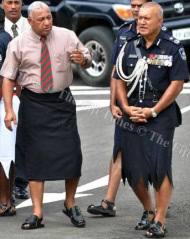 Isa, my boss Khaiyum says,
Isa, my boss Khaiyum says,'You NOT FIT to represent FFP'
One of the more prominent individuals who wanted to contest the election was Ioane Naivalarua, who was then Permanent Secretary for Foreign Affairs after a distinguished career in the military- where he reached the rank of Major-General – plus terms as Fiji’s Ambassador at Large, Commissioner of Corrections and Commissioner of Police. Naivalurua was widely respected for his professionalism and integrity but this was evidently not enough to secure even a candidate interview with the AG and Sanjay Kaba, let alone get their endorsement for the FijiFirst ticket.
Having applied to be a candidate, the Australian Defence College-trained Naivalurua heard nothing back in the way of an acknowledgement. He is said to have been in his desk at Foreign Affairs when he heard that the FijiFirst candidate’s interviews were taking place. According to sources close to him, when Naivalurua rang to enquire why he was being passed over, he was told that having failed to attach a photograph to his application, the assumption was made that he was no longer interested. But Naivalurua had supplied a photo and in any event, was a national figure with one of the most recognisable faces in the country. Stung by the humiliation of having been thwarted in pursuing a political career, he eventually resigned from Foreign Affairs and the Civil Service altogether last year and is said to have taken up farming.
It’s a sign of Aiyaz Sayed-Khaiyum’s confidence in his own position that he evidently believes he can treat a retired major-general and distinguished civil servant with such contempt. But there’s one thing he overlooked. While Naivalurua may have left Foreign Affairs, he remains on the Military Council that assisted Bainimarama with his 2006 takeover and that was reconvened by the Prime Minister after the near election defeat in 2018. And not just an ordinary member of the Council but its secretary – a position he evidently holds to this day. When H.E the President was formally installed as Honorary Colonel of the RFMF’s First Fiji Infantry Regiment two weeks ago, there was Major-General (ret’d) Ioane Naivalurua in a position of prominence not usually occupied by an ordinary farmer.
Naivalurua is not an enemy that I would have advised Aiyaz Sayed-Khaiyum to make. His humiliation at the AG’s hands enraged a significant number of his fellow military officers and those senior civil servants who had worked with him over the years. It is inconceivable to them that Naivalurua should have been passed over as a FijiFirst candidate, especially given the poor election result and when the quality of the non-iTaukei members of the government is so demonstrably lacklustre. And they are intent on avenging Naivalurua at the earliest opportunity.
The only thing delaying this retribution is one man – the Prime Minister and former RFMF commander. As we'll examine in detail next week, when Frank Bainimarama reconvened the Military Council after the humiliation of the 2018 election, it figuratively demanded the AG's head - his removal as Attorney General. Yet almost two years later, he is still there, despite his weakened political state. And some of Bainimarama’s closest supporters in both the military and his cabinet are becoming increasingly restive.
Next time: The Military Council’s blueprint for change.
Having applied to be a candidate, the Australian Defence College-trained Naivalurua heard nothing back in the way of an acknowledgement. He is said to have been in his desk at Foreign Affairs when he heard that the FijiFirst candidate’s interviews were taking place. According to sources close to him, when Naivalurua rang to enquire why he was being passed over, he was told that having failed to attach a photograph to his application, the assumption was made that he was no longer interested. But Naivalurua had supplied a photo and in any event, was a national figure with one of the most recognisable faces in the country. Stung by the humiliation of having been thwarted in pursuing a political career, he eventually resigned from Foreign Affairs and the Civil Service altogether last year and is said to have taken up farming.
It’s a sign of Aiyaz Sayed-Khaiyum’s confidence in his own position that he evidently believes he can treat a retired major-general and distinguished civil servant with such contempt. But there’s one thing he overlooked. While Naivalurua may have left Foreign Affairs, he remains on the Military Council that assisted Bainimarama with his 2006 takeover and that was reconvened by the Prime Minister after the near election defeat in 2018. And not just an ordinary member of the Council but its secretary – a position he evidently holds to this day. When H.E the President was formally installed as Honorary Colonel of the RFMF’s First Fiji Infantry Regiment two weeks ago, there was Major-General (ret’d) Ioane Naivalurua in a position of prominence not usually occupied by an ordinary farmer.
Naivalurua is not an enemy that I would have advised Aiyaz Sayed-Khaiyum to make. His humiliation at the AG’s hands enraged a significant number of his fellow military officers and those senior civil servants who had worked with him over the years. It is inconceivable to them that Naivalurua should have been passed over as a FijiFirst candidate, especially given the poor election result and when the quality of the non-iTaukei members of the government is so demonstrably lacklustre. And they are intent on avenging Naivalurua at the earliest opportunity.
The only thing delaying this retribution is one man – the Prime Minister and former RFMF commander. As we'll examine in detail next week, when Frank Bainimarama reconvened the Military Council after the humiliation of the 2018 election, it figuratively demanded the AG's head - his removal as Attorney General. Yet almost two years later, he is still there, despite his weakened political state. And some of Bainimarama’s closest supporters in both the military and his cabinet are becoming increasingly restive.
Next time: The Military Council’s blueprint for change.
